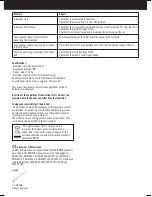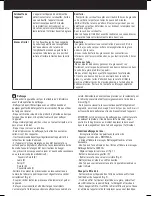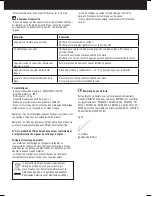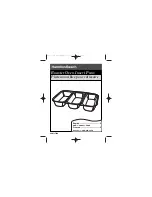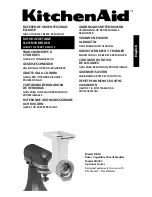
checking that the blade is well secured before beginning a new
processing.
Safety thermal protector:
- The appliance has a safety device, which protects the appliance
from overheating.
- If the appliance turns itself off and does not switch itself on
again, wait for approximately 15 minutes before reconnecting.
If the machine does not start again seek authorised technical
assistance.
Special messages:
The following messages can appear on the screen:
Awaiting JAR:
Means that the jar is not in place or has been incorrectly inserted.
Starting:
Means that it is returning to its initial position
Insert PORTION:
Means that it is operational awaiting insertion of the portion
2P:
Means that a double processing will be performed on the selected portions.
Cleaning wait:
Means that the spindle is lowering to its lower position.
Cleaning Remove the JAR:
Means that the spindle has reached its lower position and the jar may be removed in order to clean
the spindle.
Language:
Means that you have entered the language menu to select the desired language.
Once you have finished using the appliance:
- Turn the appliance off, using the on/off switch.
- Unplug the appliance to the mains.
- Clean the appliance
Practical recommendations
SUBJECT
EXPLANATION
WHAT TO DO AND WHAT NOT TO DO
Filling the frozen
food vessel
-
The frozen food expands on being
processed under pressure.
-If a vessel is over-filled with frozen food,
the food may get into the appliance and
damage its bearings.
-Over-filling the vessel may deform it.
What to do:
-Only fill the vessel with frozen food up to the maximum level marked.
-Before freezing the food, check that the vessel lid can be easily
fitted without pressing on the food.
What not to do:
-Respect the maximum level marked. If an over-filled vessel is
processed by mistake:
-After processing, clean the appliance using the cleaning function to
remove all leftover food.
Over-liquidising
of certain
ingredients
-Certain ingredients with a high content of
proteins, fats, natural emulsifiers, lecithin,
egg and by-products tend to liquidise
profusely. Filing the container to the
maximum level can lead to over-liquidising,
causing contamination problems inside the
system and subsequent dirtiness.
What to do:
-We recommend adapting the quantities of the recipe and reducing
the usual portions to levels with right level of liquidising and without
over-liquidising.
-Before freezing the food, check that the vessel lid can be easily
fitted without pressing on the food.
- If the ingredient is already frozen: we recommend processing one or
several portions and reducing the level by removing the ice by hand
until a suitable level is reached.
Before freezing
the food
-
A surface that is not flat or uneven
distribution of the frozen food may damage
the blade.
What to do:
-Flatten the surface to be frozen and ensure the lid can be fitted
easily without pressing on the food.
-Keep the outside of the vessels dry to prevent frost forming around
the vessel.
-When closing the frozen food vessel check that there is no leftover
food or water between the lid and the vessel which would make it
difficult to remove it after freezing.
What not to do:
-Re-freeze previously-processed frozen food without flattening it.
Summary of Contents for ROWZER
Page 2: ......
Page 3: ...A D E F G A1 A2 A3 A4 A5 I H C K A6 A7 B J...
Page 4: ...fig 1 fig 2 fig 3...
Page 5: ...fig 4 fig 5 fig 6...
Page 6: ...fig 7 fig 8 fig 9...
Page 43: ......


















